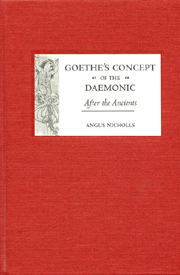Book contents
- Frontmatter
- Contents
- Editions and Abbreviations
- Acknowledgments
- Introduction
- 1 The Ancients and Their Daemons
- 2 The Daemonic in the Philosophy of the Sturm und Drang: Hamann and Herder
- 3 Romanticism and Unlimited Subjectivity: “Mahomets Gesang”
- 4 Werther: The Pathology of an Aesthetic Idea
- 5 Kantian Science and the Limits of Subjectivity
- 6 Schelling, Naturphilosophie, and “Mächtiges Überraschen”
- 7 After the Ancients: Dichtung und Wahrheit and “Urworte. Orphisch”
- 8 Eckermann, or the Daemonic and the Political
- Epilogue: Socrates and the Cicadas
- Works Cited
- Index
1 - The Ancients and Their Daemons
Published online by Cambridge University Press: 05 February 2013
- Frontmatter
- Contents
- Editions and Abbreviations
- Acknowledgments
- Introduction
- 1 The Ancients and Their Daemons
- 2 The Daemonic in the Philosophy of the Sturm und Drang: Hamann and Herder
- 3 Romanticism and Unlimited Subjectivity: “Mahomets Gesang”
- 4 Werther: The Pathology of an Aesthetic Idea
- 5 Kantian Science and the Limits of Subjectivity
- 6 Schelling, Naturphilosophie, and “Mächtiges Überraschen”
- 7 After the Ancients: Dichtung und Wahrheit and “Urworte. Orphisch”
- 8 Eckermann, or the Daemonic and the Political
- Epilogue: Socrates and the Cicadas
- Works Cited
- Index
Summary
In a letter written to Herder in July 1772, Goethe reports:
Seit ich nichts von euch gehört habe, sind die Griechen mein einzig Studium. Zuerst schränckt ich mich auf den Homer ein, dann um den Sokrates forscht ich Xenophon und Plato, da gingen mir die Augen über meine Unwürdigkeit erst auf, gerieth an Theokrit and Anakreon, zuletzt zog mich was an Pindarn wo ich noch hänge. Sonst habe ich gar nichts getahn, und es geht bey mir noch alles entsetzlich durch einander.
(FA 2,1:255–56)This letter attests to Goethe's wide-ranging and eclectic approach to classical sources. Ernst Grumach's two volume collection of Goethe's reflections on the ancients — Goethe und die Antike (Goethe and Antiquity, 1949) — demonstrates that Goethe's interest in the classical world ranged from poetry, drama, mythology, and philosophy to architecture, painting, sculpture, rhetoric, and law. For this reason, the question as to precisely which classical sources exerted the most influence upon Goethe is difficult to answer, and responses to this problem have accordingly led to broad, synoptic studies like Ernst Maass's Goethe und die Antike (Goethe and Antiquity, 1912, not to be confused with Grumach's later collection) and Humphry Trevelyan's Goethe and the Greeks (1941).
When we turn to the question of the influence exerted by classical philosophy upon Goethe's thought, the picture becomes slightly clearer. We know that Goethe was familiar with and read parts of Johann Jakob Brucker's multi-volume Historica critica philosophiae (Critical History of Philosophy, 1766–67) during his youth, volumes one and two of which provide the reader with a broad overview of classical thought from the pre-Socratics, via Socrates and Plato, to Aristotle, Stoicism, and Neo-Platonism.
- Type
- Chapter
- Information
- Goethe's Concept of the DaemonicAfter the Ancients, pp. 32 - 76Publisher: Boydell & BrewerPrint publication year: 2006



